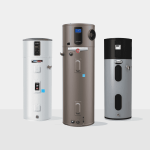In the realm of home appliances, water heaters are often overlooked heroes, silently working to provide us with hot water for our daily needs. However, traditional water heaters can be energy-intensive and costly to run, especially as we strive for more sustainable living. This is where heat pump water heaters (HPWHs) come into play, offering an innovative and energy-efficient alternative.
How Heat Pump Water Heaters Work
Unlike conventional water heaters that directly generate heat, heat pump water heaters operate on a different principle—moving heat from one place to another instead of generating heat directly. This technology leverages the same principles used in air conditioners and refrigerators but in reverse.
Here’s a simplified breakdown of how HPWHs operate:
- Heat Absorption: The heat pump system extracts warmth from the surrounding air using a refrigerant that evaporates at low temperatures.
- Heat Transfer: The extracted heat is transferred to the water in the tank through a heat exchanger.
- Heat Compression: The refrigerant, now carrying the absorbed heat, is compressed to raise its temperature significantly.
- Heat Release: The high-temperature refrigerant releases its heat into the water tank through another heat exchanger.
By efficiently transferring heat rather than generating it, HPWHs can deliver hot water with significantly less energy compared to traditional electric water heaters. In fact, they can be up to 2-3 times more energy-efficient, translating into substantial savings on energy bills and a reduced environmental footprint.
Benefits of Heat Pump Water Heaters
- Energy Efficiency: HPWHs can cut water heating energy use by up to 60-70% compared to conventional electric resistance water heaters.
- Cost Savings: While the upfront cost of a heat pump water heater may be higher, the long-term energy savings can quickly offset this initial investment.
- Environmental Impact: By consuming less energy, HPWHs contribute to lower greenhouse gas emissions, promoting a greener household.
- Versatility: HPWHs work efficiently in a wide range of climates, although they perform best in moderate to warm climates.
Considerations Before Installation
Before switching to a heat pump water heater, it’s important to consider the following:
- Space Requirements: HPWHs are larger than standard water heaters due to the additional components required for heat exchange.
- Installation Location: HPWHs work best in well-ventilated areas with some warmth, such as utility rooms or garages.
- Climate Suitability: While HPWHs are efficient in various climates, extremely cold environments may reduce their effectiveness.
Conclusion
Heat pump water heaters represent a smart, eco-friendly choice for homeowners looking to reduce their energy consumption and save on utility bills. As technology advances and awareness of sustainability grows, HPWHs are becoming an increasingly attractive option for modern households. By harnessing the power of heat transfer, these innovative appliances are paving the way for a more energy-efficient future in residential water heating.









